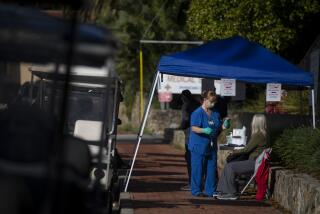King/Drew Trauma Unit a ‘Jewel’ With Big Flaws
Politicians and others fighting to save the endangered trauma center at Martin Luther King Jr./Drew Medical Center have called it “a model for the country” and “the crown jewel” of the hospital.
The reality, however, is more complicated, according to confidential reports obtained this week by The Times.
King/Drew’s trauma unit saves hundreds of lives annually. About 90% of patients survive, even though many come in with life-threatening injuries, hospital statistics show. The military recently sent doctors there for training in how to treat severe gunshot wounds.
But a March 2003 inspection report by the American College of Surgeons suggests that the prized unit has been afflicted recently by some of the same problems plaguing the hospital as a whole -- especially the failure to identify and correct mistakes.
Shortcomings at the Los Angeles County-run hospital were considered serious enough that the surgeons group refused to give its seal of approval to King/Drew last year.
It initially pulled King/Drew’s certification in 1999, a move that was described as rare by a top medical official with the organization, which verifies the quality of trauma units nationally.
In the 2003 report, expert reviewers from the surgeons group concluded that the King/Drew trauma unit failed to properly investigate questionable patient deaths, and that doctors routinely skipped meetings held to discuss treatment problems.
In addition, physician trainees were left unsupervised while resuscitating patients, and the unit closed too often to ambulances, according to the report.
Among the cases found troublesome by reviewers, who are familiar with the demands of busy urban trauma units, was that of a 22-year-old stabbing victim.
The inspectors said the woman could have lived had a surgeon not left the hospital prematurely, under the impression that her injuries were not severe.
“There was a significant delay in diagnosis and treatment,” the report states. “This was thought to be a preventable death.”
The American College of Surgeons’ approval is considered highly desirable for an urban unit of King/Drew’s importance, but it is not required.
King/Drew’s trauma chief, Jean-Claude Henry, attributed the organization’s findings to lapses in documentation, not poor care.
“Unfortunately, we’re too busy taking care of patients to really make the record look good,” he said, adding that his staff has worked hard to correct the problems.
The reports from 2003 and 1999 came to light days after county health officials proposed closing the labor-intensive unit to focus resources on fixing other parts of the troubled hospital.
On Tuesday, amid boos from a crowd of King/Drew supporters, the county Board of Supervisors voted to consider the matter at a public hearing, which has yet to be scheduled.
Several supervisors, and even the health department director, said they had not seen the reports until this week.
The director, Dr. Thomas Garthwaite, said that the quality of care at the trauma center did not figure into the board’s initial proposal to close it.
Garthwaite said he obtained the reports only after checking into assertions that the unit was among the finest.
The 2003 report was based on an inspection in October 2002.
Quality of Care Slips
After reviewing a sampling of patient records, experts concluded that the quality of care delivered at the trauma unit was “fair” -- a notch below the “good” review the hospital received in 1999.
Despite the good rating in 1999, the American College of Surgeons took the unusual step of pulling its seal because physicians let their training lag and the center lacked the ability to perform heart bypass surgery and reattach severed limbs and fingers.
In general, said Dr. David Hoyt, chief of trauma at UC San Diego and medical director of trauma for the surgeons group, losing certification is “a signal that the hospital and the medical staff have not been able to maintain the same commitment or the resources that they’ve been able to do in the past.”
In its 2003 report, the organization found that follow-up measures to determine why patients died and what might be corrected were insufficient in at least seven cases.
“I am not sure why this patient died,” an expert said of a 19-year-old man shot in the chest.
Patients die in every trauma unit, said Dr. Demetrios Demetriades, trauma director at County-USC Medical Center, who was not involved in the review.
But “the fact that you do not identify the problem and you do not take appropriate action to prevent future occurrences is considered a negative thing,” he said.
Though largely critical, the American College of Surgeons’ 2003 report praises the trauma center for its handling of at least 10 cases.
“Excellent care and a great save by the trauma service,” was how a reviewer described the care of one stabbing victim who survived, for example.
King/Drew’s trauma center was the second-busiest of the 13 units in the county last year, treating 2,150 patients with gunshot and stab wounds and other major injuries. It is highly regarded by many in the community it serves.
But the unit’s quality is not the main concern for some of its supporters.
Again and again at Tuesday’s supervisors hearing, community members warned that the unit’s closure would mean longer travel times for patients and lives lost as a result.
Many politicians and community members, however, have portrayed the unit as exceptional -- not just as compared to the rest of the hospital but to other units statewide and nationally.
It’s “the most important and effective trauma unit in California,” Assemblyman Mervyn Dymally (D-Compton) said in a statement last week.
The trauma center, “correct me if I’m wrong, was never the subject of any report, any recommendation, any consultant’s review that in any way [found] that this trauma center was performing badly,” Los Angeles City Councilwoman Janice Hahn said at a rally Sept. 17. “It has been said that it has been a model for the country.”
After learning of the American College of Surgeons’ reports Friday, Hahn insisted that the trauma center “has performed miracles, has saved lives.”
Yaroslavsky Skeptical
But county Supervisor Zev Yaroslavsky said statements glorifying the trauma center are “transparently false or belie good information.”
One of the two hospitals most likely to absorb King/Drew’s trauma cases, St. Francis Medical Center, is not approved by the American College of Surgeons.
The other, county-owned Harbor-UCLA Medical Center, historically has been approved but is set to be reinspected soon.
County-USC, the only other county-run hospital with a trauma unit, has the organization’s approval, as do such private hospitals as Cedars-Sinai and UCLA medical centers.
King/Drew as a whole is reeling from criticism by regulatory and accrediting groups that, among other things, have found neglect by nurses, medication errors, use of stun guns on mental patients and shortfalls in physician training.
The trauma center’s problems are not limited to those identified in the American College of Surgeons’ report.
Other troubles have hobbled the unit or threatened to close it:
* A national agency earlier this year withdrew the hospital’s ability to train aspiring surgeons and radiologists, once key members of the staff.
* In February 2003, the county stripped King/Drew of its official status as a pediatric trauma center after its pediatric intensive care unit failed a state inspection. In practice, the action meant that most children with traumatic injuries were no longer taken there by ambulance.
* The national agency that accredits hospitals as a whole, the Joint Commission on Accreditation of Healthcare Organizations, is threatening to pull its seal of approval from King/Drew. Should that happen, the hospital would be forced to close its trauma center.
Henry said he decided against stepping down as trauma chief this summer, as planned, to devote himself to keeping the unit alive.
“Every single life that is saved is worthwhile,” he said. “It’s not about politics. It’s not about numbers. It’s about one life at a time.”
More to Read
Start your day right
Sign up for Essential California for news, features and recommendations from the L.A. Times and beyond in your inbox six days a week.
You may occasionally receive promotional content from the Los Angeles Times.





